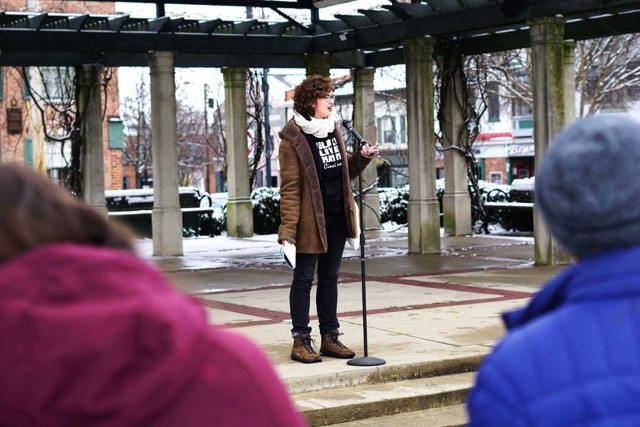In fact, she was dead set on it. She’d lived in Luxembourg her whole life and planned to study somewhere in Europe.
Orlander grew up and attended primary school in Bridel, but her family moved around a lot. By the time she went off to university, she had lived in eight different houses in four different towns.
As a student at the Lycée Aline Mayrisch, Orlander had the chance to travel to the US and attend summer classes at Miami University, in Oxford, Ohio, through a scholars programme for high school students. The opportunity seemed too good to pass up.
When it came time to head to the states, she registered for an introductory philosophy class, but had trouble selecting a second one.
She ended up choosing a class on social justice studies which she didn’t even know was a programme at the time; she’d just seen it in the course catalogue. The decision ended up being a pivotal moment in her life. She ended up applying to Miami with an interest in the social justice studies programme and later double majored in the western programme.
Student aid
However, once Orlander was accepted to Miami, she had to figure out how she could afford to go there.
“That was a huge factor because I grew up relatively poor,” Orlander said. “My country hasn’t always been good to me, but having said that, being from my country has allowed me to do things that I think I would have a harder time doing in other places such as having the scholarships that I had to go to school.”
Thanks to Luxembourg’s student loan programme, she was able to go study in the US.
“I have a lot of points of criticism for the programme,” Orlander said during an interview with Delano, in Luxembourg, on 17 May. “But when it comes to the people applying from the lowest income bracket that my family’s in, it’s definitely a blessing to have that.”
When she arrived on Miami’s campus, she got involved in a few on-campus student organisations such as Spectrum, The F Word and Black Women Empowered which are all diversity related groups.
Toward the end of Orlander’s second semester, she was approached by Mariah Green, former secretary for the Diversity Affairs Council which is a part of Miami’s Associated Student Government and was asked take over leadership the organisation.
Green wanted to find someone who could bring the organisation forward, so Orlander decided to run for secretary and was appointed soon after.
Gender-neutral toilets
“It was a good experience for me, but it was really hard to do that kind of work in [ASG] because we just didn’t operate in the same language on so many ways,” Orlander said.
Near the end of her one-year tenure on the DAC, she led an initiative to get gender-neutral toilets on Miami’s campus. Miami already had single-stalled “family” restrooms, but the issue was with the gendered pictograms on the signs.
“It was just something, to me as a queer person who also identifies as genderqueer and doesn’t put much stock into these binary rules, that was an important thing to do,” Orlander said.
She wanted the community to take a step forward and affirm to all of the queer, trans, gender non-conforming people and to anyone for whom the bathroom issue is an issue that they are welcome on campus.
“When you come to campus and you’re maybe gender non-conforming or you’re trans, having to make that choice between the pictogram with that weird skirt or cape and the other pictogram that’s just straight, you have to be constantly choosing who you are and who you’re presenting when you’re doing that,” Orlander said. “It can be a real struggle.”
After debating the issue, ASG voted and an overwhelming majority sided with Orlander and the DAC, so gender-neutral restroom signs were installed across campus.
Internship experience
In the fall of 2016, Orlander completed a residency programme in Over-the-Rhine in Cincinnati, Ohio. She then interned at the Cincinnati Interfaith Workers Center. The organisation handles primarily wage-theft, but also work-place discrimination and safety and health violations.
It was an important time for her to be in Cincinnati and away from the university because the presidential election was taking place as well as the trial around the racially-charged murder of Sam DuBose. She even found an activist group she could plug into during her time there.
“I was glad that I was out of that bubble,” she said. “I was glad that what I was dealing with wasn’t entitled fraternity boys because I would have not thrived in that environment. I would have not been happy in that environment.”
Magda Orlander has taken her passion for activism from Luxembourg to the US and now is working to secure workers’ rights in Cincinnati, Ohio. She is pictured shortly before her graduation in May 2017. Photo: Ryan Terhune
After completing the internship, she found out that the workers center had a job opening.
“I spoke with some people and was encouraged to apply, so here I am,” Orlander said, “I moved to the city, and I’m going to start working at the workers center once my work permit clears.”
While Orlander loved being in school, and has intentions to eventually go to graduate school, she’s happy to be doing something different for now.
“I think you get wrapped up in a lot of this university organisational stuff,” she said. “It’s really important when you’re there, and it really matters to the students, and then you leave the university, and it’s just very different. The issues that people are dealing with are very different.”

